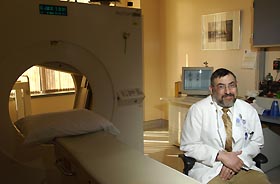|
This is an archived article.
For the latest news, go to the
Advance Homepage
For more archives, go to the Advance Archive/Search Page. | ||
|
Health Center Offers New Liver Cancer Treatment A new radiation treatment for liver tumors is now available at the UConn Health Center, the only site in New England that offers the specialized procedure. The treatment, called selective internal radiation therapy, or SIRT, is for patients with inoperable primary liver cancer or other cancers that have spread to the liver.
The SIRT procedure delivers radiation to the liver in minuscule spheres about the size of a speck of flour. The spheres, which contain radioactive yttrium-90, are injected into the main hepatic artery and delivered directly to the cancer tumor. Since healthy liver tissue draws most of its blood from the portal vein, the spheres delivered through the hepatic artery target the cancerous tumor growth in the liver. These spheres are just large enough to get stuck in the blood vessels of the tumor and directly irradiate it. This ability to direct the radiation limits the amount of radiation that reaches healthy liver tissue and other parts of the body. To determine the amount of radioactive spheres that will reach the tumor, radiologists inject a similar solution of radioactive particles that allows them to view a "snapshot" of the particle distribution, explains Ronald Weiner, a radiopharmacist and associate professor of diagnostic imaging at the Health Center. "We can see how much of the radioactive spheres would reach the liver," he says. "If too much of the solution reaches healthy tissues or other healthy parts of the body, then this therapy is not an option for that patient. "SIRT can significantly affect the length, and quality, of life," he adds, "but it's not a cure. We try to cure cancer a little at a time." |

